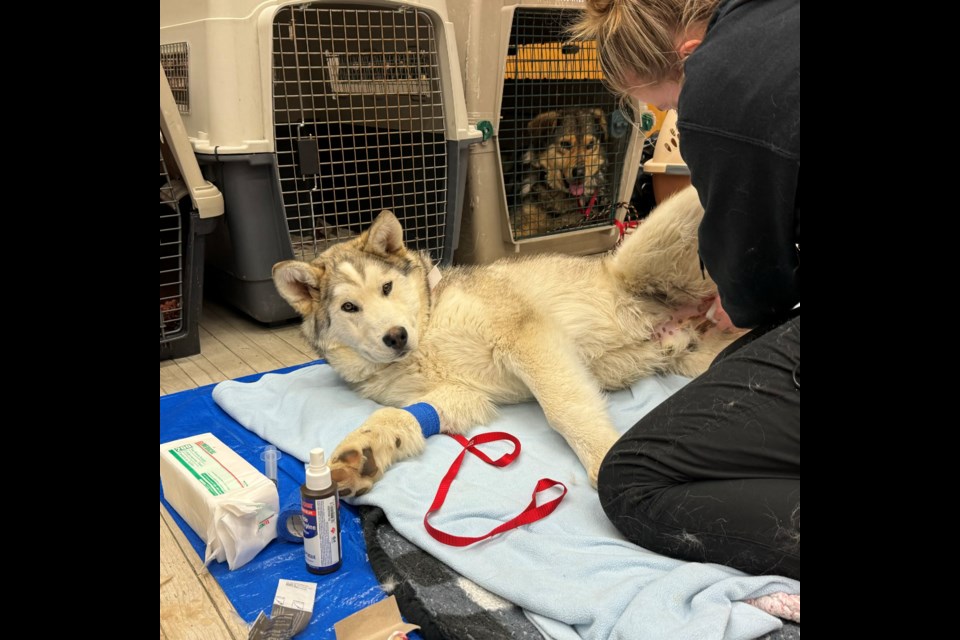WEBEQUIE FIRST NATION — Animal services are growing across Matawa First Nations.
Webequie First Nation hosted a community-wide spay and neuter clinic, in partnership with Dr. Patricia Lechten and her team from Allandale Veterinary Hospital in Barrie, Ont., as part of Matawa First Nations Management’s (MFNM) animal services pilot-project.
The clinic was held from May 1-4.
Quite a few community members took advantage of the spay/neuter clinic, resulting in 59 spay/neuter surgeries (53 dogs, 6 cats), 97 animal wellness exams (including one guinea pig), and 188 vaccinations (parvovirus and rabies shots).
Webequie Band Councillor, Harry Wabasse, said the turnout is representative of community members’ connection to their pets.
“It brought out some people to really look at the well-being of their pets. I think it shows that there are a lot of people who care about their pets in the community,” he said.
Matawa First Nations Management began their animal services pilot-project on February 5.
The project is going to run until March 31, 2025.
In a broad sense, the animal services pilot-project involves hosting clinics – just like the one held in Webequie – for seven of the nine Matawa communities to provide pet-owners with an opportunity to address any health concerns their pets have and to have them spayed or neutered.
Judi Cannon, animal services lead coordinator for Matawa, said the organization hopes to arrange clinics in Marten Falls and Nibinamik - and work with their partners at the Ontario Society for the Prevention of Cruelty to Animals in order to host clinics in Eabametoong, Constance Lake, Ginoogaming and Long Lake #48 First Nations.
Neskantaga First Nation held a clinic in 2023 and Aroland First Nation receives clinics annually in collaboration with the University of Guelph veterinarian program.
Of course, the clinics are just one facet of the overall project with education and general support being other focus areas.
For example, the clinic in Webequie also included the delivery of a dog safety program at the local school, student tours of the clinic with onsite teaching included, information for students about careers in animal-related fields such as veterinarians, registered veterinarian technicians, and program managers, and provided dog and cat food to pet owners.
Each MFNM community has also hired a part-time animal guardian in conjunction with the pilot project.
Speaking to Dougall Media, Cannon emphasized how integral the animal guardians are to the project.
“There’s a great need for the animal guardians to be in the communities and part of the pilot project is really based on their information and their collection of information from the community members – how many animals are there, what the chief and band council desire for their communities, but also the community members.
“As pet ownership changes in communities, we want to develop these programs and develop sustainable services so they can continue to have those healthy relationships and connections to their animals,” Cannon said.
Bertha Ashpanaquestcum is the animal guardian for Webequie First Nation. She has been active in her role for just over a month.
Ashpanaquestcum described her role as an animal guardian, which entails gathering information about pets in the community and working with families or single owners to keep their animals happy, healthy, and reduce their fertility rates.
“It (allows) me to help others who have pets, any kind of pet – we even have hamsters here – cats and dogs. I didn’t know there were so many pets here,” she said.
As the owner of five dogs, Ashpanaquestcum said being a pet owner has been beneficial not just for her own mental health but also her children.
She also noted the importance of animal vaccines – especially in Webequie.
“Vaccines are important for dogs and cats – any of kind of pets that we have in our home. It is important for them to get vaccinated. Last year, we lost a lot of pets to the parvovirus,” she said.
She said it was particularly hard for children in the community to see their pets suffering with sickness.
On that note, Cannon added that having clinics and the animal guardians in place addresses what Matawa considers great inequalities in communities across the north when it comes to access to veterinary care.
“There are significant barriers - there are travel barriers but there are also barriers in the lack of veterinarians that are able to come up (here) – also equipment and skilled professionals to come in and help deliver these clinics.
"However, working alongside animal guardians like Bertha, we’re able to start sewing those gaps together but also to really find out what the communities want so we can build those plans out, it’s sustainable, and we don’t have those large gaps within those services we are delivering.
“In the One Health model, we know: healthier animals, healthier people, healthier environment. It all works together. Just really supporting the traditions of these communities where they want that connection with the animals and they need the support of these important veterinarian services – not just every 10 years.
"We want it to be a proactive program instead of being reactive when there’s a challenge. We don’t want to go rushing to communities, we want to be there in a sustainable, long-term, proactive (way) not only for the animals but for the people of the communities as well,” she said.
